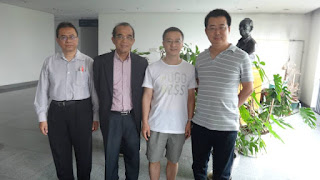Just yesterday morning, my son went to school to remove his pink wristband and with that he is officially considered as Covid-19 free (what a relief). Thus, his second swab test must have shown negative result. So, today he will be taking his first SPM paper which I think is the third paper of history. I pray that he will do well.
History allows us to give a sense of perspective, where we have been, and why are we as we are now. If lessons are properly learned, they may be useful to chart the future. I'm not much of a history buff, but I tend to think more about the future. Being part of the university administration before, I do tend to look at what would be called 'prominent universities' to see what are their traits. When I was in the administration of the maths institute, I do look at the well-known research institutes abroad, most of which are in the west (does that make me an anglophile or having signs of a colonised mind?). There is one in Japan that I was already aware of while I was in Cambridge namely, RIMS, Kyoto; this is mainly due to its journal Publications of RIMS. Of course, another one in Asia is Chern Institute in Tianjin that I've been to for Group-29 and also we have visited thereafter. See the pics below showing the entrance to the institute and a photo with Lei Fu (wearing shorts) the then Director of Chern Institute and Chengming Bai, the deputy at the time. Its current director is Chengming Bai who has visited us during EQuaLS8.
A more recent institute that I have looked up to (and had wished to visit it, but now it will just remain a dream) is Perimeter Institute. It is interesting to read how Perimeter Institute was formed and you can read it in Howard Burton's book "First Principles: The Crazy Business of Doing Serious Science". Now most of these institutes focus much in very theoretical research. Certainly in my mind, this is not where our strength lies and if one further impose the kind of KPIs that is made for applied sciences, certainly it would cause problems. What would be the characteristic of our institute certainly occupies much of my mind then (of course, not now). Certainly it would not be of a simple carbon copy of any existing institute. Some would think that we are too simplistic (too dumb?) in that sense, which is far from the truth. I remember the heavy discussions I had with Lamberto Rondoni on what should fuel the research in the then conceived Malaysia-Italy centre (See pic below with the Italian ambassador, Lamberto having a taste of Malaysia wedding and finally, Lamberto, Santo and me in Turin).
Elsewhere, of course, we have the many institutes in Singapore. There is also our visit to Centre for Quantum Technologies in NUS.
All these visits are made possible by the hosting institutes and centre and we appreciated their generosity very much. Note that these are distinguished centres that I dream to have collaborations with over time (we have to make our mark first) and they were kind enough to entertain our requests and thoughts of possible collaboration.
So, I'm a bit frustrated to see some of the comments on what we were trying to do, as if we were not thinking about national interest and the deeper stuff of what we are going to be. What more with all the constraints that we had. Anyway, whatever it is, the younger generation (and certainly the current university administration) needs to chart whatever future of the institute now.
For me, my thoughts now are simply on what else I can do for the relatively small theoretical physics group we have before I leave, which is not going to be long.






No comments:
Post a Comment